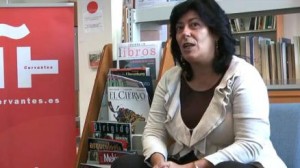Blog del Instituto Cervantes de Dublín
Torre Martello
Interview with Almudena Grandes
Almudena Grandes: A writer stops being a nervous novice around the third novel
Interview with Almudena Grandes held on 24th March 2011 at the Dámaso Alonso Library of the Instituto Cervantes in Dublin on the occasion of her participation in the round table discussion “More than poetry” with Luis García Montero.
Almudena Grandes (Madrid, 1960) studied Geography and History at the Universidad Complutense. She became known as a novelist with Las edades de Lulú(1989). Her novels Te llamaré Viernes (1991), Malena es un nombre de tango (1994), Atlas de geografía humana (1998) Los aires difíciles (2002), Castillos de cartón (2004) and El corazón helado (2007), along with her short stories, have made her one of the biggest names in contemporary Spanish literature. WithInés y la alegría (2010) she began the series Episodios de una guerra interminable, of which the second novel in the series is El lector de Julio Verne (2012). Several of her works have been made into films, and have won many awards.
Carmen Sanjulián: —Almudena, what were you like as a child?
Almudena Grandes: —I was very chubby and so much so that I think it affected the way I acted. I was a chubby little girl who read a lot. I think the children that are bookworms, that read a lot, are often chubby, have a limp, wear glasses, have braces on their teeth… because literature is like having another life and it allows you to live a life better than your own. So I really liked reading, I really liked chocolate, and I still do, although I don’t eat it anymore, and I was a good student and, well, I was like any normal girl.
Carmen Sanjulián: —Of all the places you’ve visited, do you have “one place in the world”, like in the film…?
Almudena Grandes: —I’d have to say my favourite part of the world is Latin America. Even though it’s very far away and when I’m writing I don’t like to travel because it separates me a lot from my books, but there are places I just can’t resist: Buenos Aires is an irresistible city, Mexico or Colombia are irresistible countries, Nicaragua… However, one place in the world… Maybe for me, one place in the world would be closer to home, because I live in Madrid and I wouldn’t like to live anywhere else. In summer, I go to this little village in Cádiz, called Rota, which is sort of like an “annual paradise” and I wouldn’t change it for anywhere else either. I’ve laid down roots and I wouldn’t like to live anywhere else other than where I do now.
Carmen Sanjulián: —Lulú, Malena or Inés, who would you pick?
Almudena Grandes: —At the moment, it would be Inés, of course, because she’s the latest. You always pick the most recent book. Las edades de Lulú will always be a very important book to me because it was the novel that enabled me to live in the way in which I wanted to live. The book that enabled me to become a writer. Malena is also very important because it was my third novel. I think a writer stops being a nervous novice around the third one. In some way, the third is the one that establishes you and I owe that peace of mind to Malena. I have a good relationship with all three.
Carmen Sanjulián: —Is there any cure for a frozen heart?
Almudena Grandes: —That’s what we’re trying to find out: El corazón helado (The frozen heart). I gave it that title because we Spaniards are always repeating Machado’s verses: “One of those two Spains will freeze your heart”, and the idea was to write a book explaining what had happened. I think there is, I think there is a cure. I think sooner or later Spain has to come to terms with its relationship with the past.
Carmen Sanjulián: —Can everything be forgiven, or are there things which are unforgivable?
Almudena Grandes: —I think there are things which are unforgivable. Not everything can be forgiven, but I think everything can be understood. There are things which are unforgivable, but when we look at the terrible things that happened during the war and the post-war years, we’re lucky in that too much time has passed for us to be on a quest for revenge. It’s more about understanding what happened, getting people to sit down and agree on the bases for a different future, in a way which acknowledges the past and where we’ve come from. In that sense, I’m not a fan of hysterical revenge, or radical stances.
In Spain a lot of people are criticising the transition, I don’t criticise it because I think that process was the best that a generation, who thought they had to do something honourable, could do. The issue is that now we should be left to do the honourable thing in the way that we think is right, but it’s not a question of attacking the past head on.
Carmen Sanjulián: —A dream?
Almudena Grandes: —A dream would be to be happy, of course, that those around me are happy and to be a grandmother in the not too distant future. I’d love to be a grandmother in a few years’ time. My grown up children don’t understand that, but I think I would be a great grandmother.
Recomended links
- [Video] Interview with Almudena Grandes at the Instituto Cervantes in Dublin by Carmen Sanjulián.
- Almudena Grandes’ official website.
- Almudena Grandes in Tusquets Publishing House.
- Review of El lector de Julio Verne in El Cultural.




